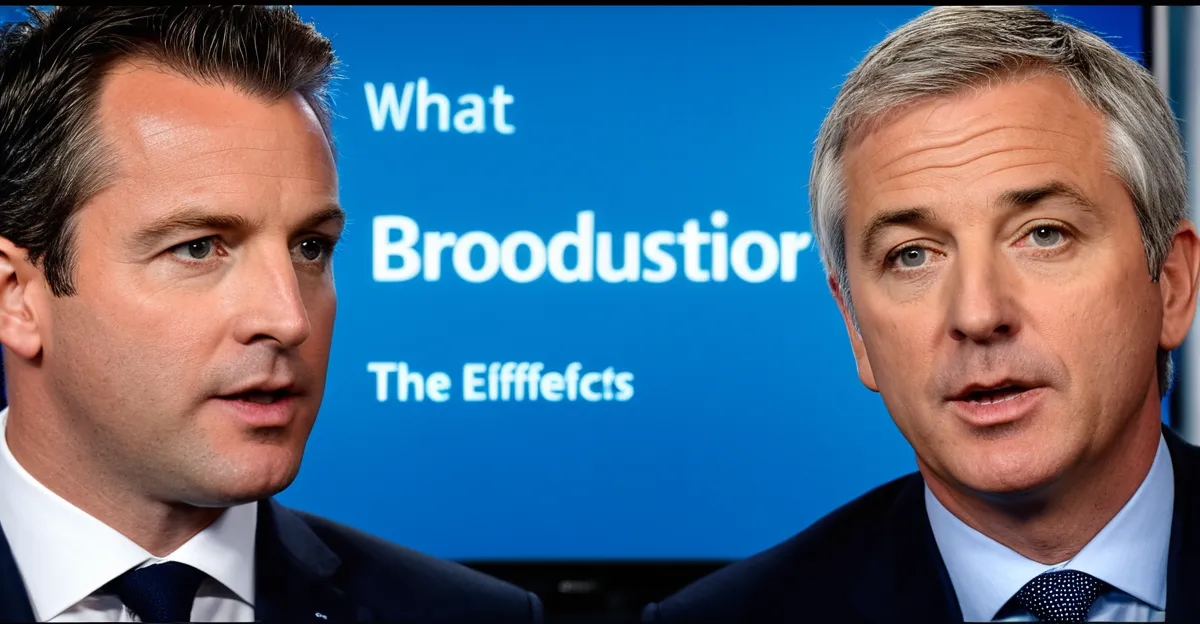Overview of Recent UK Broadcasting Regulatory Changes
Recent UK broadcasting regulations have undergone significant updates aimed at modernising the sector and ensuring fair competition, content diversity, and consumer protection. These regulatory changes include revisions to rules governing content standards, advertising limits, and public service broadcasting obligations. Ofcom updates have emphasized strengthening protections around harmful content and improving transparency in broadcasting operations.
Key areas affected by these changes involve increased scrutiny on online and digital broadcasting platforms, tighter regulations on advertising practices, and modified compliance protocols for content aimed at children. Ofcom’s role has expanded to enforce these adjustments, reflecting the evolving media landscape where traditional TV intersects with streaming and on-demand services.
Additional reading : What are the effects of immigration on the UK’s labor market?
The intended goals behind the Ofcom updates focus on safeguarding viewers while encouraging innovation and diversity. By updating the framework, regulators aim to balance broadcasters’ operational freedom with responsibilities to audiences. This includes fostering a competitive environment that supports new entrants alongside established broadcasters and promoting content that aligns with contemporary social values.
Direct Effects of Regulatory Changes on Broadcasters
Recent UK broadcasting regulations have imposed stricter compliance requirements that demand significant operational adjustments from broadcasters. As Ofcom updates introduce new rules around content standards and advertising, broadcasters face the task of revising their business models and content policies to avoid penalties. For instance, tighter restrictions on advertising volumes and placements require careful scheduling and revenue realignment.
Also read : What are the impacts of recent UK healthcare initiatives?
Broadcasters must allocate considerable resources to monitoring and ensuring adherence to these rules, increasing compliance costs. This includes investments in personnel training, legal consultation, and technology to track content compliance, especially for on-demand and digital platforms now under Ofcom’s expanded remit. Smaller providers, in particular, encounter challenges balancing these increased operational burdens with limited budgets.
Moreover, funding models are impacted as stricter public service broadcasting obligations influence content commissioning and production budgets. Broadcasters are re-evaluating program portfolios to comply with new guidelines while maintaining audience appeal. These operational challenges highlight the ongoing need for strategic adjustments within UK broadcasting organisations to align with the evolving regulatory changes framed by Ofcom updates.
Case Studies: How Major UK Broadcasters Are Affected
Examining the BBC regulation impact, the corporation has had to adjust its content commissioning to meet updated Ofcom standards emphasizing diversity and audience protection. As part of these regulatory changes, the BBC has increased investment in original programming that complies with stricter content guidelines while managing licence fee-funded budget constraints. This reflects a broader shift in balancing public service obligations with evolving UK broadcasting regulations.
ITV’s response to ITV regulation changes showcases operational realignment, especially in advertising practices. With tighter restrictions on advertising volumes and timings, ITV has refined its scheduling strategy and explored digital advertising options to maintain revenue streams while adhering to compliance requirements. This is a direct example of how Ofcom updates have forced traditional broadcasters to innovate within their business models.
Channel 4 has taken a proactive approach by leveraging its public-service remit to expand content diversity and digital outreach. The broadcaster has adapted to regulatory changes by investing in on-demand platforms, meeting new guidelines designed to protect vulnerable audiences. In doing so, Channel 4 demonstrates how compliance can coincide with strategic growth in a competitive environment reshaped by recent UK broadcasting regulations.
Collectively, these broadcaster examples illustrate the short-term operational challenges and longer-term strategic shifts required to navigate the changing Ofcom updates landscape effectively. Each case displays a tailored approach to compliance, funding, and content strategy adjustments in response to evolving industry rules.
Expert Insights and Industry Reactions
Industry opinion on recent UK broadcasting regulations reveals a mix of cautious optimism and concern. Regulatory analysts acknowledge that the latest Ofcom updates are well-intentioned, aiming to protect audiences and promote diversity, but they emphasize the complexity broadcasters face when interpreting and implementing these rules. The expanding remit of Ofcom means broadcasters must navigate increasingly intricate compliance landscapes, which can strain resources and operational capacity.
Broadcaster feedback highlights practical challenges arising from tightened compliance requirements. Many industry insiders express worries about the financial and administrative burdens imposed by these regulatory changes. Smaller and mid-sized networks, in particular, find it harder to keep pace with the accelerated rule adjustments. However, some broadcasters appreciate clearer guidelines around content standards and advertising, which can help reduce ambiguity and risk in programming decisions.
Predictions for future trends focus on how ongoing Ofcom updates might shape the sector. Experts foresee more regulatory convergence across traditional and digital platforms, pushing broadcasters toward integrated compliance frameworks. There is also anticipation that broadcasters will increasingly leverage technology, such as AI-driven content monitoring tools, to manage compliance efficiently. Overall, while concerns persist regarding operational impact, the industry recognizes the potential for these regulatory changes to stimulate innovation and align broadcasting with evolving audience expectations.
Opportunities and Challenges Created by New Regulations
The recent UK broadcasting regulations present both regulatory challenges and fresh broadcasting opportunities for industry players. A primary challenge lies in managing the heightened compliance requirements, which compel broadcasters to invest significantly in legal expertise, content monitoring, and technological infrastructure. These operational demands can disproportionately affect smaller broadcasters, intensifying barriers to market entry and sustainable competition.
Conversely, the regulatory changes open avenues for innovation, especially through digital expansion and novel content formats. As Ofcom updates extend oversight to online and on-demand services, broadcasters are incentivized to develop diverse, accessible programming that aligns with audience expectations and regulatory standards. This shift encourages exploration of interactive and targeted content strategies, creating competitive advantages for early adopters.
The evolving landscape reshapes competitive dynamics within the UK sector. Traditional broadcasters must balance legacy obligations with the flexibility to exploit digital platforms, while emerging players may leverage modern compliance frameworks to differentiate themselves. Overall, the interplay between these regulatory challenges and broadcasting opportunities shapes a transformative period, calling for strategic agility amid shifting audience behaviors and regulatory priorities.

